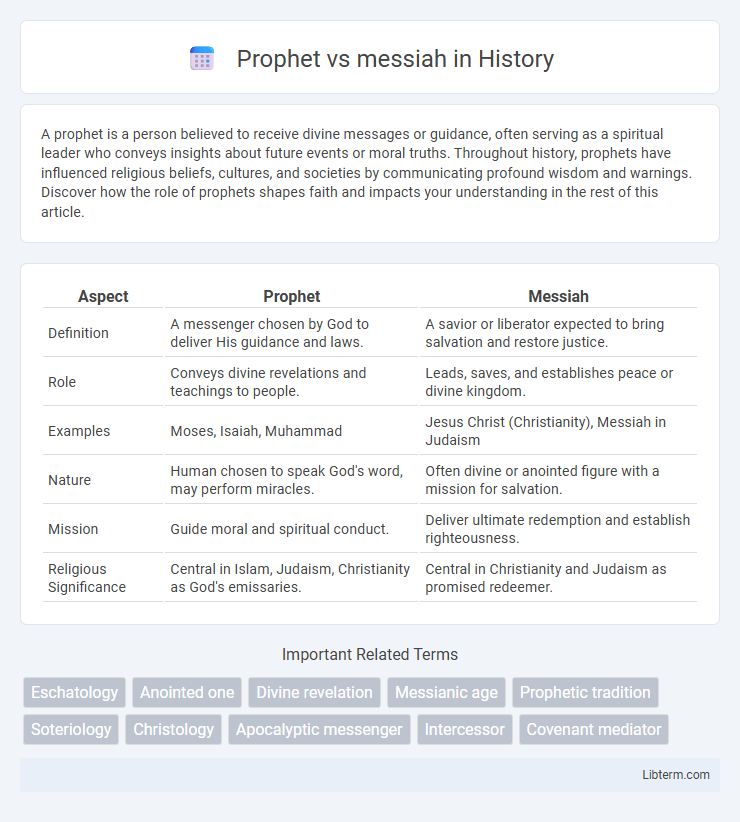A prophet is a person believed to receive divine messages or guidance, often serving as a spiritual leader who conveys insights about future events or moral truths. Throughout history, prophets have influenced religious beliefs, cultures, and societies by communicating profound wisdom and warnings. Discover how the role of prophets shapes faith and impacts your understanding in the rest of this article.
Table of Comparison
| Aspect | Prophet | Messiah |
|---|---|---|
| Definition | A messenger chosen by God to deliver His guidance and laws. | A savior or liberator expected to bring salvation and restore justice. |
| Role | Conveys divine revelations and teachings to people. | Leads, saves, and establishes peace or divine kingdom. |
| Examples | Moses, Isaiah, Muhammad | Jesus Christ (Christianity), Messiah in Judaism |
| Nature | Human chosen to speak God's word, may perform miracles. | Often divine or anointed figure with a mission for salvation. |
| Mission | Guide moral and spiritual conduct. | Deliver ultimate redemption and establish righteousness. |
| Religious Significance | Central in Islam, Judaism, Christianity as God's emissaries. | Central in Christianity and Judaism as promised redeemer. |
Defining Prophet and Messiah
A prophet is a person believed to be chosen by a divine source to deliver messages, guidance, or revelations to people, often foretelling future events and calling for moral or spiritual reforms. A messiah, specifically in Abrahamic religions, is seen as a savior or anointed one sent to bring salvation, deliverance, or establish a divine kingdom. The key distinction lies in the prophet's role as a messenger versus the messiah's role as a redeemer or liberator.
Historical Origins of the Terms
The terms "Prophet" and "Messiah" originate from distinct historical and religious contexts; "Prophet" derives from the Greek word *prophetes* meaning "one who speaks for a god," rooted in ancient Judaic tradition as divine intermediaries. "Messiah," from the Hebrew *mashiach*, meaning "anointed one," historically referred to kings and priests set apart for divine service, later evolving in Jewish thought as the expected deliverer. The divergence in these terms reflects differing roles: prophets as communicators of divine will and messiahs as divinely appointed saviors or kings in theological narratives.
Roles and Functions in Religion
Prophets serve primarily as divine messengers, conveying God's commandments and warnings to guide moral and spiritual conduct within a community. Messiahs are regarded as anointed leaders or saviors prophesied to deliver and restore a people, often bringing spiritual salvation or political liberation. While prophets emphasize revelation and guidance, messiahs symbolize fulfillment of divine promises and ultimate redemption in religious traditions.
Prophet vs Messiah in Abrahamic Faiths
In Abrahamic faiths, prophets are individuals chosen by God to deliver divine messages and guidance, acting as intermediaries between God and humanity, while the Messiah is anticipated as a savior or anointed one who will bring ultimate redemption and restoration. Prophets such as Moses, Isaiah, and Muhammad conveyed God's laws and warnings, whereas the Messiah, notably Jesus in Christianity, fulfills a redemptive role central to eschatological hope. Judaism awaits a future Messiah who will restore Israel and establish peace, distinguishing the prophetic role from the messianic mission within its religious framework.
Key Figures: Prophets and Messiahs
Prophets are key figures in religious traditions who deliver divine messages and guide people according to spiritual laws, exemplified by Moses in Judaism and Muhammad in Islam. Messiahs are anointed saviors expected to bring salvation or liberation, with Jesus Christ as the central Messiah in Christianity and the awaited Mahdi in Islamic eschatology. The roles of prophets and messiahs differ fundamentally: prophets convey God's will, while messiahs fulfill redemptive promises pivotal to their faiths.
Messianic Prophecies and Their Interpreters
Messianic prophecies, found in texts such as Isaiah, Daniel, and Psalms, predict a future anointed leader who will deliver and restore Israel. Interpreters from Jewish, Christian, and Islamic traditions offer varying analyses, with Christians identifying Jesus as the Messiah fulfilling these prophecies, while Jewish interpretations often await a future Messiah yet to come. Scholarly debates emphasize linguistic nuances, historical contexts, and theological perspectives that influence the understanding and application of these prophetic scriptures.
Authority and Revelation
A prophet serves as a divine messenger, conveying revelations from God without possessing inherent authority, often calling people to repentance or foretelling future events based on divine guidance. In contrast, the messiah is endowed with supreme authority, embodying the fulfillment of divine promises and establishing a new covenant or era, often exercising judgment and salvation roles. The distinction lies in the prophet's role as a conduit for God's word, whereas the messiah embodies divine authority and ultimate revelation.
Eschatology: End-times Roles
In eschatology, the Messiah is prophesied as the anointed deliverer who establishes God's kingdom, bringing peace and resurrection at the end of days. Prophets serve as God's messengers, providing warnings, guidance, and revelations about the impending judgment and divine plan. The Messiah's role surpasses that of prophets by initiating the final restoration and eternal reign foretold in apocalyptic scriptures.
Contemporary Interpretations
Contemporary interpretations distinguish the prophet as a messenger who delivers divine guidance based on revealed knowledge, while the messiah is seen as a savior figure who brings redemption and fulfills eschatological promises. In modern theological discourse, prophets are often understood as social reformers advocating ethical living, whereas the messiah embodies hope for transformative salvation and justice. This distinction shapes current interfaith dialogues, highlighting differing roles in spiritual leadership and eschatology.
Common Misconceptions
The terms "Prophet" and "Messiah" are often conflated, but they carry distinct meanings in religious contexts--prophets are individuals chosen to deliver God's messages, while the Messiah is expected to be a divinely anointed savior. Common misconceptions include the belief that all prophets are messianic figures or that the Messiah must perform miracles akin to prophetic acts. Understanding the unique roles of prophets, such as Moses or Muhammad, versus messianic expectations tied to Jesus in Christianity or the awaited Mahdi in Islam clarifies their separate theological functions.
Prophet Infographic

 libterm.com
libterm.com